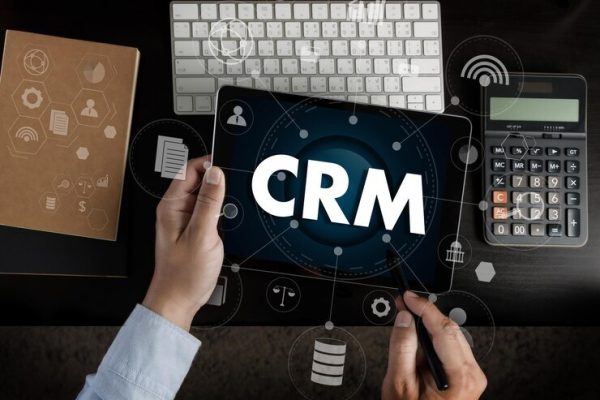When you’re managing a small medical center, it’s easy to feel like you have too many responsibilities. There are so many things that need to get done and so little time to do them in.
But if you want your organization to succeed, one of the best ways to make sure things run smoothly is by using an effective CRM system. A SaaS solution can help with this process by automating processes and streamlining workflow.
There are plenty of options available on the market today! In this blog post we’ll discuss how to choose the best SaaS CRM for a small medical center.
So, you can get started quickly with no headaches or wasted time spent researching different solutions before making an investment decision.
1. Determine Your Needs.
You should start by determining your medical center’s current CRM system. What do you currently have in place, and what are the benefits? Look at how it performs: is it easy to use? Does it integrate with other systems like point-of-sale software or patient management software?
Next, consider whether a SaaS CRM platform would be an improvement for your organization. If the answer is yes, then there are two things to watch out for: cost savings and ease of use/integration with other systems such as POCs (point of care) or EMRs (electronic medical records).
Here are some tips to help you determine your needs and choose a CRM that best fits your requirements:
- Identify your specific requirements: The first step is to identify your specific needs and requirements. Consider what type of data you need to collect and store, what kind of reports you need to generate, and what features you need to streamline your workflow.
- Determine your budget: Your budget will play a crucial role in selecting a CRM system. Consider the cost of the software, any ongoing maintenance or support fees, and the potential return on investment.
- Evaluate user-friendliness: A CRM system that is easy to use and has an intuitive interface will be easier for your staff to adopt and use on a regular basis. Consider a system that has a well-designed interface and offers a seamless integration with your existing systems.
- Consider security and compliance: In the healthcare industry, data security and compliance are crucial. Look for a CRM system that has appropriate security measures in place, such as encryption, and is compliant with regulations such as HIPAA.
- Look for customization and flexibility: Your medical center may have unique needs that require a tailored solution. Consider a CRM system that is customizable and flexible enough to accommodate your unique requirements.
- Check for integration capabilities: A CRM system that can integrate with your existing software, such as your Electronic Health Records (EHR) system, can save time and reduce errors. Look for a CRM system that has integration capabilities or APIs that can be used to connect with other software.
2. Consider the Value.
How do you determine whether a SaaS CRM is right for your medical center? It’s important to understand what a SaaS (software as a service) CRM is. A SaaS solution is one that comes on-demand–meaning you don’t have to install anything or maintain any software other than the program itself.
This allows for greater flexibility in terms of deployment and use, which can be especially helpful when managing multiple locations or if you’re running out of space on your server.
Here are some tips to consider the value of a SaaS CRM for your medical center:
- Lower up-front costs: With a SaaS CRM, you pay a monthly subscription fee rather than an up-front license fee. This can be particularly beneficial for a small medical center that may not have the resources for a large initial investment.
- Scalability: It can be easily scaled up or down depending on the needs of your medical center. As your medical center grows, you can easily add new users or upgrade your subscription to include additional features.
- Access from anywhere: It can be accessed from any device with an internet connection, which can be particularly useful for medical staff who need to access patient data while on the go.
- Regular updates and maintenance: With a SaaS CRM, you don’t have to worry about updates or maintenance – the provider takes care of that for you. This can save you time and resources that would otherwise be spent on managing updates and maintenance.
- Security and compliance: SaaS CRM providers typically have dedicated security teams and comply with industry regulations, such as HIPAA. This can help ensure that your patient data is secure and compliant with regulations.
3. Research the Available SaaS Options.
Before you choose a SaaS CRM, it’s important to research the available options.
Look at the features of each system and decide which ones will be most beneficial for your business. The price should also be an important factor in deciding on which service you will use. You want to make sure that you don’t overpay for something that won’t work for your company or is too complicated for its needs; this can cause problems down the road if changes need to be made or new features added later on down the line (and there are often large costs associated with making those changes).
Also make sure that any support offered by their customer service team is clear and easy-to-understand. So, they can help guide users through any issues they might encounter during setup or usage of an app/service/software package. Especially, if these unexpected issues arise during opening day usage!
- Define your needs and requirements: Before starting your search, define your needs and requirements for the SaaS solution. This includes things like the features you require, the size of your team, and your budget.
- Do a Google search: Use a search engine like Google to find SaaS options that fit your requirements. Use keywords related to your needs and requirements, such as “project management SaaS” or “HR management SaaS”.
- Read reviews: Look for reviews of the SaaS options you’re interested in. You can find reviews on websites like Capterra, G2 Crowd, or TrustRadius. These sites offer user reviews and ratings of SaaS products.
- Check out the company’s website: Visit the website of the SaaS provider to learn more about their product, pricing, and features. Look for information on the company’s history, mission, and values.
- Talk to the provider’s customer support: Contact the provider’s customer support team and ask them any questions you may have about their product.
4. Evaluate the Solutions You’re Considering.
As you evaluate SaaS CRM solutions, consider the following factors:
- Features. What features does your existing system have? Does it offer some of the same functionality that you want to add with a new solution? How powerful are those features, and what are they capable of doing now or in the future (including adding new functionality)?
- Cost. Is there any cost associated with switching over to a new system or not changing anything at all? Will you be able to afford this expense in the long run, or do you need another option before making any decisions about which product would best suit your needs? If so, how much will it cost per month after one year has passed from when you first signed up for service/support etc., so that customer retention is maximized given how expensive software licensing models tend toward increasing yearly rates based on usage levels; i
5. Understand Your Company’s Goals.
Understanding your company’s goals is essential when choosing a Customer Relationship Management (CRM) system.
Here are a few reasons why:
- Alignment with business goals: By understanding your company’s goals, you can select a CRM system that aligns with your overall business objectives. For example, if your goal is to increase customer retention, you can look for a CRM that has strong customer retention features such as customer feedback and loyalty programs.
- Efficient use of resources: Knowing your business goals can help you choose a CRM system that best uses your resources, both in terms of time and money. You can select a CRM system that is scalable and provides the functionalities that you need, without overspending on features that are not necessary for your business.
- Improved customer experience: A CRM system helps you manage your customer interactions more effectively. By aligning your CRM with your company’s goals, you can improve the customer experience and create more loyal customers.
- Measurable results: Understanding your business goals enables you to select a CRM system that provides measurable results. You can set metrics that are aligned with your goals and track progress, allowing you to see the value that the CRM system brings to your business.
6. Consider the Size of Your Medical Center.
When choosing a CRM system for a medical center, the size of the medical center is an important factor to consider. Here are a few reasons why:
- Scalability: The size of your medical center is an important factor in determining the size and complexity of the CRM system that you need. If you are a small medical center, you may need a CRM system that is less complex and less expensive than what a larger medical center would require. On the other hand, if you are a larger medical center, you may need a more robust and scalable CRM system that can handle a larger volume of patient interactions and data.
- Customization: The size of your medical center can affect how customizable your CRM system needs to be. Smaller medical centers may be able to use off-the-shelf CRM solutions, while larger medical centers may need a more customized system that can be tailored to their specific needs.
- Budget: The size of your medical center is also an important factor in determining your budget for a CRM system. Smaller medical centers may have a smaller budget for a CRM system, while larger medical centers may have a larger budget to invest in a more robust system.
- Integration: The size of your medical center can affect how your CRM system needs to integrate with other systems. For example, a larger medical center may need a CRM system that can integrate with their electronic health records (EHR) system or other medical software systems, while a smaller medical center may not require this level of integration.
7. Reassess Your Current CRM System.
Once you have a clearer picture of your needs, it’s time to reassess your current CRM system. If you have an existing SaaS solution that works well enough, consider keeping it in place.
There are several reasons why a company might want to reassess its current CRM system and potentially choose a new one:
- Outdated technology: If your current CRM system is outdated, it may not be able to keep up with the evolving needs of your business. Newer CRM systems often come with better features and functionality that can improve your sales and marketing efforts.
- Limited scalability: If your company has grown or plans to grow, your current CRM system may not be able to handle the increased workload. A new CRM system may offer better scalability options and be able to accommodate your company’s growth.
- Poor user adoption: If your current CRM system is difficult to use or lacks certain features that are important to your team, it may lead to poor user adoption. A new CRM system that is more user-friendly and tailored to your team’s needs can help increase adoption and productivity.
- Inadequate reporting and analytics: If your current CRM system doesn’t provide the level of reporting and analytics you need to make data-driven decisions. It may be time to consider a new CRM system that offers more robust reporting and analytics features.
8. Assess Your Business Processes.
Assessing your business processes is an important step in choosing a CRM system because it allows you to identify what you need from a CRM system and ensure that the system you choose aligns with your business goals and workflows.
Here are some reasons why it’s important to assess your business processes before choosing a CRM:
- Identify pain points: By analyzing your business processes, you can identify pain points in your sales, marketing, and customer service workflows. These pain points can help you determine what features and functionalities your CRM system needs to have to help your team work more efficiently and effectively.
- Streamline workflows: An effective CRM system can help you streamline your business processes by automating repetitive tasks, providing better organization and tracking of customer data, and improving communication between teams. By understanding your workflows, you can choose a CRM system that best fits your business processes and helps to optimize them.
- Improve customer experience: The customer experience is a critical aspect of any business. By assessing your business processes, you can identify areas where a CRM system can help improve the customer experience, such as by providing better customer data, tracking customer interactions, and automating customer follow-up tasks.
- Ensure system adoption: If a CRM system doesn’t align with your business processes or meet the needs of your team, it may be difficult to get your team to adopt it. By choosing a CRM system that aligns with your business processes, you can help ensure that your team will be more likely to use it effectively.
- Optimize performance: A CRM system can help you optimize the performance of your business by providing you with valuable data and analytics to measure your success. By understanding your business processes, you can choose a CRM system that provides the right data and analytics to help you make informed decisions and drive growth.
9. Look at Your Internal and External Customer Touchpoints.
When you look at your internal and external customer touchpoints, you can see how they are connected. If a client is already in the system, that’s fine; but if they’re not, it may not be worth having them sign up right away.
Consider what kind of information needs to be collected from your customers before they decide whether or not to become a subscriber. Are there any common questions that come up on your website? What should they know about the process of signing up for an account?
How can you help them understand more about what happens after those first few steps with us–and how will this improve their experience with us as our relationship grows?
You’ll want to take these things into consideration when determining which SaaS CRM option is best for your business!
Here are some reasons why it’s important to look at your internal and external customer touchpoints before choosing a CRM:
- Identify customer needs: By looking at your customer touchpoints, you can identify the needs and expectations of your customers. This information can be used to choose a CRM system that provides the features and functionalities your customers need to have a positive experience with your business.
- Improve customer experience: It can help you improve the customer experience by providing a single, unified view of customer data across all touchpoints. By understanding your customer touchpoints, you can choose a CRM system that provides the right data and tools to help you better understand your customers and provide a more personalized experience.
- Streamline customer interactions: By using a CRM system to manage your customer interactions, you can streamline your business processes and ensure that your customers receive a consistent experience across all touchpoints. By understanding your customer touchpoints, you can choose a CRM system that provides the right tools to manage customer interactions effectively.
- Optimize communication: Communication is a critical component of any business. By using a CRM system to manage your customer interactions, you can improve communication between teams and ensure that everyone has access to the same customer data. By understanding your customer touchpoints, you can choose a CRM system that provides the right communication tools to help you work more effectively with your customers.
- Drive growth: By using a CRM system to manage your customer interactions, you can gain valuable insights into your customers’ needs and behaviors. This information can be used to identify new opportunities for growth and to optimize your sales and marketing strategies. By understanding your customer touchpoints, you can choose a CRM system that provides the right data and analytics to help you drive growth and improve your bottom line.
Why is Hubspot the Best SaaS CRM for a Small Medical Center?
HubSpot is a popular CRM platform that offers a range of features and benefits that make it an ideal choice for small medical centers.
Here are some reasons why HubSpot may be the best SaaS CRM for your small medical center:
- Affordable: HubSpot’s pricing plans are designed to fit small businesses’ budgets. They offer a free plan that includes many basic CRM features, making it an affordable option for small medical centers.
- Easy to use: Its user-friendly interface and intuitive design make it easy to use, even for non-technical staff. The platform is designed to be simple and straightforward, allowing your team to focus on patient care rather than spending hours trying to figure out complicated software.
- Customizable: It allows you to customize your CRM according to your specific needs. You can add or remove fields, create custom pipelines, and set up automated workflows that fit your medical center’s unique processes.
- Marketing automation: HubSpot provides powerful marketing automation tools that help you streamline your patient outreach and engagement. You can create email campaigns, set up social media integrations, and track patient interactions all in one place.
- Comprehensive reporting: HubSpot’s reporting and analytics tools provide insights into your medical center’s performance. You can track metrics like patient acquisition, lead sources, and revenue growth, allowing you to make data-driven decisions about how to optimize your patient care and business operations.
Conclusion
In conclusion, choosing the best SaaS CRM for a small medical center can be a challenging task, but it is essential to improve patient care and overall efficiency of the center.
After evaluating various SaaS CRM options, it is recommended to choose a CRM that is specifically designed for the healthcare industry, offers features such as patient information management, appointment scheduling, and telemedicine integration, and is cost-effective for a small medical center.
Ultimately, the best SaaS CRM for a small medical center will depend on the specific needs and requirements of the center. It is important to thoroughly research and evaluate all options before making a decision to ensure that the chosen CRM meets the center’s needs and helps them achieve their goals.
If you’re looking for a hassle-free CRM for your medical center then the HubSpot can be the best option for you. Sign Up now and enjoy FREE trial then decide.





